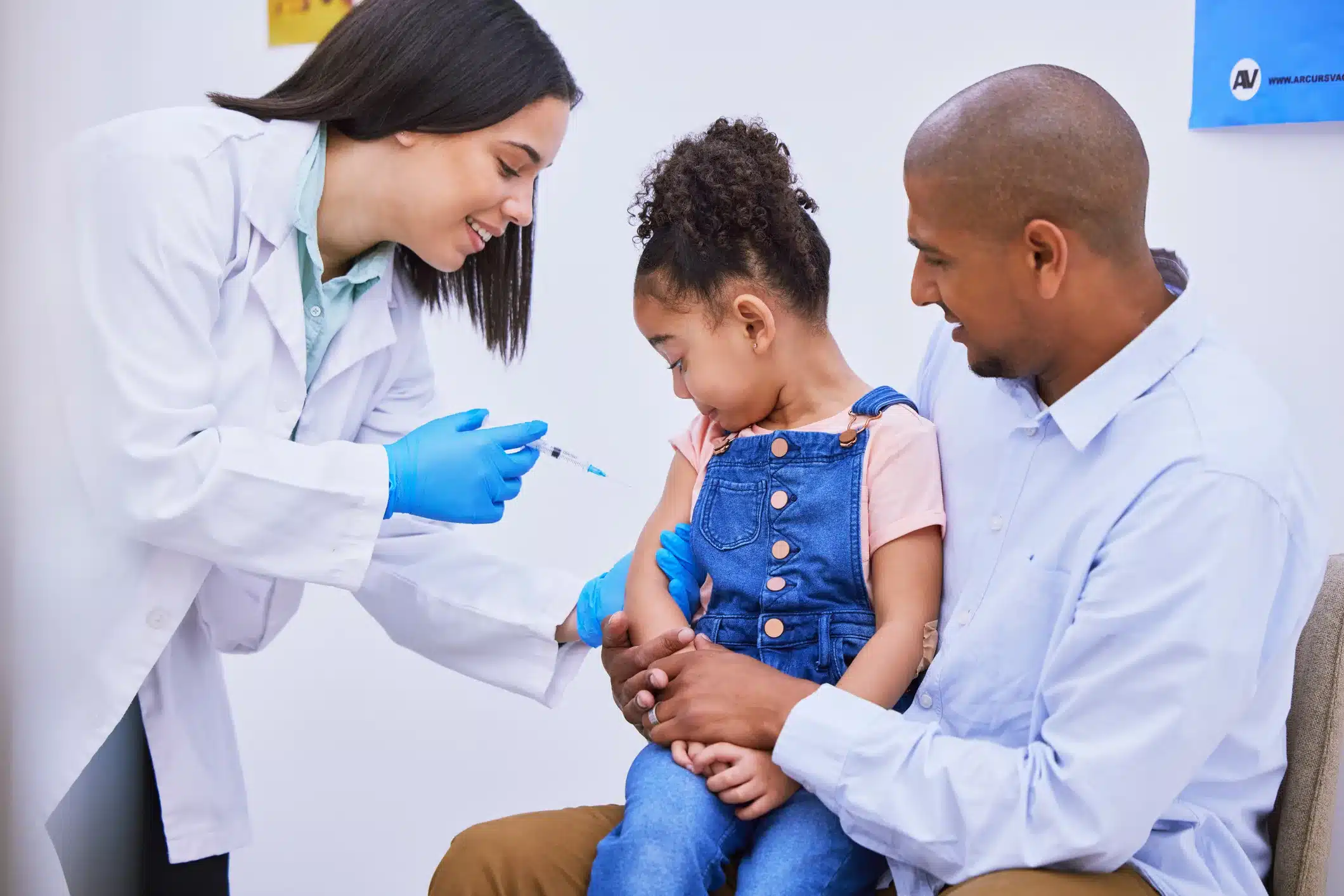Getting the right information about childhood vaccines can be overwhelming. KidsStreet’s pulled together some of the most frequently asked questions from parents to help you keep your little ones happy and healthy!
Are Vaccines Safe?
Yes! Vaccines administered in the United States undergo rigorous study and testing by the Centers for Disease Control and Prevention (CDC) and National Institutes of Health (NIH) before they can be approved by the Federal Drug Administration (FDA). Even after vaccines receive approval, the CDC continues to monitor their effectiveness. They also investigate any reports of adverse reactions to ensure vaccine safety.
The American Academy of Pediatricians (AAP), physicians committed to caring for infants, children, and adolescents, strongly recommends that all children be vaccinated on time according to the CDC immunization schedule.
The AAP, CDC, FDA, NIH, and other medical groups, such as infectious disease doctors, review the vaccine recommendations yearly.
Can Vaccines Cause the Disease It’s Supposed to Prevent?
Vaccines made from dead or partial bacteria or viruses cannot cause disease.
Live-attenuated vaccines can possibly cause a very mild form of the disease, but it is extremely rare. That’s because the live virus used in vaccines is incredibly weak. If it does cause the disease, your child is in much less dangerous than being infected with the disease-causing virus.
Do Vaccines Cause Autism?
No, vaccines do not cause autism.
This myth came from a fraudulent research study published by Dr. Andrew Wakefield in 1998. He suggested that the MMR (measles, mumps, and rubella) vaccine may cause autism. It was a poor study based on only 12 children and is false, as proven by hundreds of other scientific studies. Dr Wakefield lost his medical license for continuing to push this myth.
In fact, this myth has long-lasting consequences. Many parents were concerned about Dr. Wakefield’s claims and declined to vaccinate their children. Even though measles was declared eliminated in the United States in 2000, we’ve seen outbreaks throughout the U.S. as recently as 2019.
How Will My Child’s Healthcare Provider Ensure Vaccine Safety?
Your child’s healthcare provider can help keep them on their recommended vaccine schedule. They will review any allergies or illnesses your child may have, requiring an alternate vaccination schedule.
Your child’s healthcare provider will also have you and your child wait in the clinic for observation for 15 to 20 minutes after each vaccine. Severe reactions to vaccines are extraordinarily rare, but if they do happen, reactions occur almost immediately after the vaccine is administered. If your child has a rare reaction, your child’s healthcare provider can immediately provide the attention your child needs.
Isn’t My Child Already Protected If All Their Friends are Vaccinated?
No, this strategy does not protect your child against vaccine-preventable diseases. You may believe all your child’s friends are vaccinated, but they may not be. Others traveling in your community may also expose your child to vaccine-preventable diseases.
What Are the Side Effects of Vaccines?
Your child may experience some mild side effects after a vaccine. The most common side effects include:
- Feeling tired
- Headache
- Mild fever
- Muscle and joint aches
- Redness at the injection site
- Soreness at the injection site
These are not allergic reactions. These side effects are good signs that your child’s immune system is fighting against the vaccine and generating immunity to the diseases they have been vaccinated against.
Why Are Multiple Doses of Some Vaccines Required?
Some vaccines take time and repeated exposure to develop immunity, so they may be given in a series. Some viruses change from year to year and require an annual vaccine, such as the influenza vaccine. Other vaccines, such as diphtheria, tetanus, and acellular pertussis (DTaP) vaccines, only offer immunity for a limited time and require boosters.
Why Vaccinate Against Diseases Nobody Gets Anymore?
There are so few cases of diseases, such as diphtheria, hepatitis, measles, and tetanus, because most children are immunized with vaccines. If we stop vaccinating, children will no longer be protected by immunization. Without immunization, your child may contract vaccine-preventable diseases when exposed to others with the disease.
What Can I Do to Make Vaccination Easier for My Child?
Seeing your child get vaccination shots is hard. Most children are more scared by the anticipation of the shot than they are of the actual pain of the shot. Here are some tips to make the process easier for your little one and for you:
- Bring their favorite blanket or stuffed animal for them to snuggle with.
- Distract them with a bright or noisy toy to reduce their anxiety.
- Give them a sweet snack. Sugar is a safe and effective way to decrease distress and pain during minor procedures, especially in infants and toddlers.
- Remain with your child. Your presence will bring them comfort when they are scared.
The most important thing you can do is keep your child on schedule with their recommended vaccinations. This will help protect them from serious diseases that can require hospitalization, cause disability, or be life-threatening.
Turn To KidsStreet Urgent Care
Is it time for a scheduled vaccine? Or does your kiddo need to catch up on their vaccines? KidsStreet Urgent Care can help!
Register online to visit the clinic. You and your child can wait in the convenience of your home or vehicle until we are ready to see you.
KidsStreet loves walk-ins too! However, we recommend registering online before your visit to reduce in-clinic wait times. Walk-ins join the same queue as those who register online.

